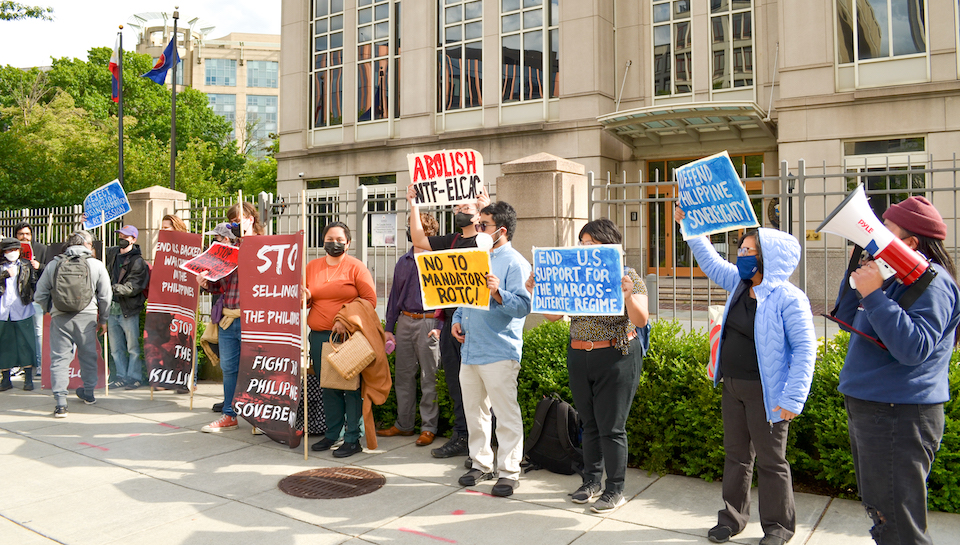WASHINGTON DC — Philippine President Ferdinand Marcos Jr. was met with protest led by members and allies of the International Coalition for Human Rights in the Philippines (ICHRP) during a speaking engagement hosted by the Center for Strategic & International Studies (CSIS). The event was one of Marcos’ final stops in his first official working visit to Washington, and follows a high-level “2+2” ministerial dialogue held between the two countries last month.
In his speech, Marcos elaborated further on the future of economic cooperation between the two countries, which will soon be guided by the new U.S.-Philippines Trade and Investment Framework Agreement (TIFA), as well as the existing Indo-Pacific Economic Framework (IPEF). Activists noted, however, that a “partnership” founded on chasing after foreign investments, particularly in sectors like mining, would put the Filipino people on the losing end.
Exposing the impacts of destructive mining projects on indigenous communities, Drew Miller of ICHRP stated, “In the far flung areas where the Lumad live, the government of the Philippines shut down their schools, labeled them as breeding grounds for terrorists, and said they’re encouraging rebellion, when all they are doing is providing relevant and accessible education, which the government fails to provide.”
Miller continued, “Marcos Jr.’s policies and push for further foreign investment will continue to exploit and displace them from their mineral-rich lands.” In 2011, the U.S. assessed that Mindanao — the ancestral home of the Lumad — had $1 trillion-worth of untapped resources. It has been the site of frequent violence and land-grabbing tied to mining operations.
Protesters also responded to Marcos’ claims that U.S. military bases established in the Philippines under the Enhanced Defense Cooperation Agreement (EDCA) would not be used for war with China over Taiwan as tensions escalate in the region. Marcos instead defended the EDCA bases as principally for aid in natural disaster response and to “address climate change”
Leo Wu of the International League of People’s Struggles (ILPS) refuted this claim, stating, “[The U.S.] calls the Philippines an unsinkable aircraft carrier, which means they want to put the Philippines at the forefront of the coming war between the US and China.”
Josef of Malaya Movement Baltimore meanwhile pointed out the irony in saying that EDCA bases would help address climate change, noting that “the U.S. is actually the world’s number one polluter.”
Founded in 1962 as a think tank to study political and economic policy to “sustain American prominence and prosperity as a force for good in the world,” the Center for International and Strategic Studies (CSIS), strongly endorsed the recent developments in the US-PH "alliance."
This event put a close to the “Marcos Out of DC Week of Action.” This was Marcos’ second time in the country after having been granted presidential diplomatic immunity, thereby protecting him from an ongoing U.S. contempt order in the sum of $353 million.
prbayanusadmv230504



No comments:
Post a Comment